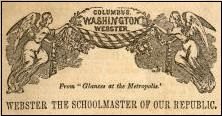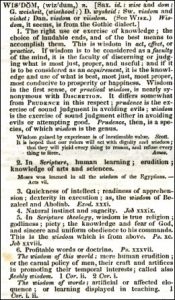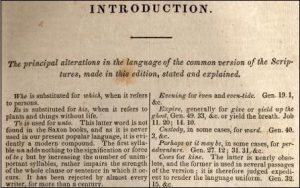As the school year comes to a close, this is a good time to remember a man who had a profound impact on America’s educational system: Noah Webster.
Noah was born on October 16, 1758 in Hartford, Connecticut 1 and had four brothers and sisters. 2 At the age of sixteen, he went off to Yale, 3 where he was twice called to go out as a soldier in the American Revolution. 4
 After completing college, he became a schoolteacher. 5 Recognizing the importance of providing an American rather than a British education, Noah began writing distinctly American books 6 that taught children Americanized spellings, readings, and pronunciations as well as American history. 7 Noah was adamant that just as America had worked hard to become an independent Nation, she also needed a uniform language. 8 His profound influence in shaping America’s educational system earned him the title “Schoolmaster to America.” 9
After completing college, he became a schoolteacher. 5 Recognizing the importance of providing an American rather than a British education, Noah began writing distinctly American books 6 that taught children Americanized spellings, readings, and pronunciations as well as American history. 7 Noah was adamant that just as America had worked hard to become an independent Nation, she also needed a uniform language. 8 His profound influence in shaping America’s educational system earned him the title “Schoolmaster to America.” 9
Among his many remarkable achievements, the one for which he is probably most widely known today is his Webster’s Dictionary. In 1806, he produced an early small dictionary that provided proper spellings and meanings of words. 10 But he followed that with years of learning some twenty different languages so that he could trace the origins of English words back to their original roots in various languages, and then create a definition for the words based on those translations. 11 As he explained, “I spent ten years in making a Synopsis of twenty languages, viz., the Chaldaic, Syriac, Hebrew, Samaritan, Arabic, Ethiopic, and Persian; the Hiberno Celtic or native Irish; the Anglo-Saxon, German, Dutch, Swedish, Danish; Greek, Latin, Italian, Spanish, French, Russian, and English, to which may be added the Armoric and Welsh.” 12 In 1828, his massive dictionary was finally finished, containing some 70,000 words.
Strikingly, his strong Biblical faith is evident throughout the dictionary, and he frequently used Scriptures to help illustrate the meanings of words. (See, for example, the graphic of the word “wisdom” to the left.)
 Five years later, taking what he had learned from his extensive work on the dictionary, Noah published an updated version of the King James Bible, replacing outdated ancient words with their more modern meanings. For example, he replaced the King James word “kine” with its modern equivalent, “cow or cattle.” Noah believed strongly in the inerrancy of God’s Word, so wanting to ensure that he had changed none of the doctrinal meanings of the Scriptures with his word changes, in the preface to his Bible he listed all the specific words that he had updated so that people would know and could investigate for themselves exactly what he had and had not changed. This 1833 Bible is considered the first “modern” language American translation.13 While preparing both his Dictionary and the Bible, Noah wrote many letters that reveal his deep love for God and the Scriptures. (We have posted some of those original letters which we own on our WallBuilders website.)
Five years later, taking what he had learned from his extensive work on the dictionary, Noah published an updated version of the King James Bible, replacing outdated ancient words with their more modern meanings. For example, he replaced the King James word “kine” with its modern equivalent, “cow or cattle.” Noah believed strongly in the inerrancy of God’s Word, so wanting to ensure that he had changed none of the doctrinal meanings of the Scriptures with his word changes, in the preface to his Bible he listed all the specific words that he had updated so that people would know and could investigate for themselves exactly what he had and had not changed. This 1833 Bible is considered the first “modern” language American translation.13 While preparing both his Dictionary and the Bible, Noah wrote many letters that reveal his deep love for God and the Scriptures. (We have posted some of those original letters which we own on our WallBuilders website.)
Another example of Noah’s strong Christian faith is found in a letter that he wrote in 1809. This letter was so well received that it was later printed in a magazine as a stand-alone article (The Peculiar Doctrines of the Gospel Explained and Defended).
Having spent his life working to improve educational content and make the Word of God more readable for the common man, Noah Webster died 170 years ago on May 28, 1843. 14
Endnotes
1 Horace E. Scudder, American Men of Letters, Noah Webster (Boston: Houghton Mifflin and Company, 1882), 2.
2 Emily Ellsworth Fowler Ford, Notes on the Life of Noah Webster, ed. Emily Ellsworth Ford Skeel (New York: Privately printed, 1912), I:15; Scudder, American Men of Letters (1882), 3.
3 Scudder, American Men of Letters (1882), 4; Ford, Notes on the Life of Noah Webster, ed. Skeel (1912), I:14-15.
4 Henry Phelps Johnston, Yale and Her Honor Roll in the American Revolution (New York: Privately Printed, 1888), 11-14,77-78, 341; Scudder, American Men of Letters (1882), 5-7.
5 Scudder, American Men of Letters (1882), 8-9.
6 Scudder, American Men of Letters (1882) 33-35.
7 Scudder, American Men of Letters (1882) 34-38, 277-278.
8 Scudder, American Men of Letters (1882) 242-243, 277.
9 Harry R. Warfeel, Noah Webster: Schoolmaster to America (New York: The MacMillan Company, 1936); see also reprints of Webster’s works such as William Webster, A Sequel to Webster’s Elementary Spelling Book (Philadelphia: J. B. Lippincott Company, 1845).
10 Scudder, American Men of Letters (1882) 216.
11 Noah Webster, An American Dictionary of the English Language (New York: S. Converse, 1828), 1:Preface; Scudder, American Men of Letters (1882) 236.
12 Noah Webster to Samuel Lathan Mitchell, December 12, 1823, Letters of Noah Webster, ed. Harry R. Warfel (New York: Library Publishers, 1953), 410.
13 The Holy Bible, Containing the Old and New Testaments in the Common Version, ed. Noah Webster (New Haven: Durrie & Peck, 1833), Preface.
14 Scudder, American Men of Letters (1882) 279.
Still looking for answers? Visit our FAQ page
More Resources
Know the Truth and Protect Your Freedoms.
Still looking for answers? Visit our FAQ page
Stay Informed with the Latest Resources
Enter your email address to receive our regular newsletter, with important information and updates right in your inbox!










